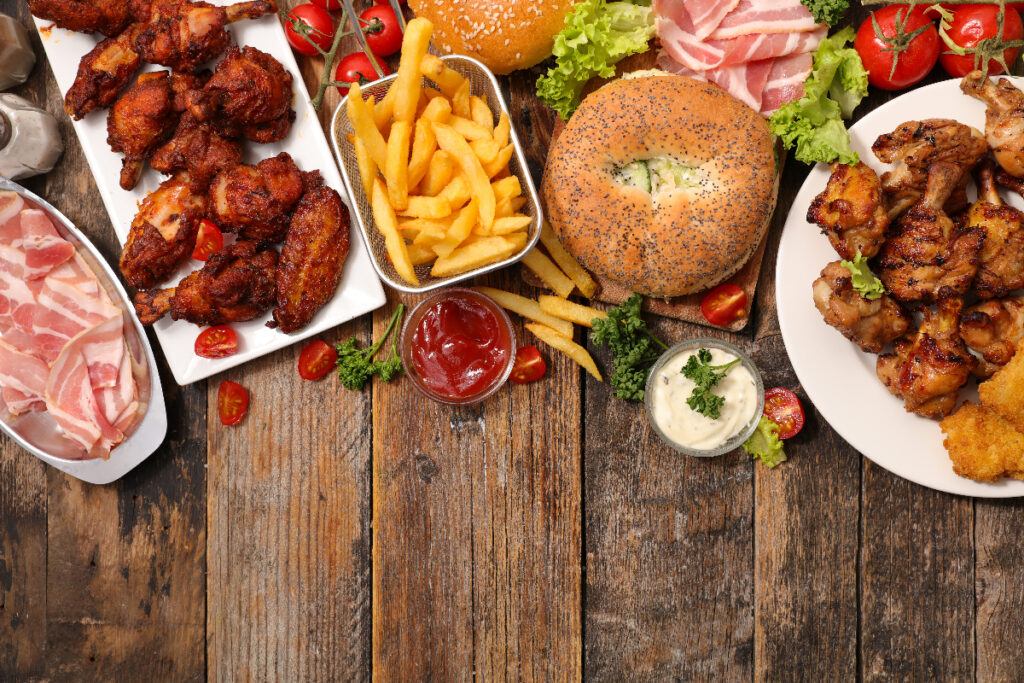
Your diet plays a big part in the health of your spine. If you have back pain, here are some foods you should avoid eating:
- Sugary foods: Sugary foods can trigger inflammation in your spine and can lead to weight gain. Foods with artificial sweeteners should be avoided too because they can also trigger inflammation.
- Processed corn: Corn is usually good for you, but not when it’s processed. Processed corn can cause a spike in insulin and inflammation.
- Red meat: Red meat is good for you, but you shouldn’t eat a lot of it because it can cause inflammation.
Back pain is one of the most common health complaints affecting people across the world. It can stem from poor posture, muscular strain, spinal disc issues, or chronic conditions such as arthritis. While treatments often focus on physical therapy, medications, and lifestyle changes, diet plays a surprisingly important role in managing and potentially reducing back pain. Certain foods may contribute to inflammation, exacerbate discomfort, and hinder the body’s ability to heal. Understanding which foods to avoid is essential for anyone looking to manage or reduce chronic back pain effectively.
The Role of Inflammation in Back Pain
Inflammation is a key factor in many types of back pain, especially in cases of chronic conditions such as sciatica, osteoarthritis, herniated discs, and ankylosing spondylitis. Inflammation occurs when the immune system responds to injury or infection, but when it becomes chronic, it can damage tissues and contribute to persistent pain. The foods we consume can either promote or reduce inflammation. Highly processed, sugary, and fatty foods often lead to systemic inflammation, which aggravates existing back problems.
Refined Sugars and Sugary Beverages
One of the most harmful dietary choices for individuals with back pain is the regular consumption of refined sugars. Foods high in sugar can cause blood sugar spikes and increase levels of inflammatory markers in the body. Soda, energy drinks, candy, pastries, and desserts are not just calorie-dense; they actively promote inflammation by increasing cytokine production. Inflammatory cytokines can worsen the discomfort associated with back conditions, especially when consumed consistently over time.
Furthermore, sugary drinks contribute to weight gain, which adds stress to the spine and lower back. Excess weight can strain muscles, ligaments, and joints, leading to postural imbalances and worsening pain. Eliminating or significantly reducing refined sugar intake is one of the first steps toward a more back-friendly diet.
Trans Fats and Hydrogenated Oils
Another group of dietary culprits includes trans fats and hydrogenated oils. These fats are commonly found in fried foods, fast food, processed baked goods, margarine, and packaged snacks. Trans fats not only raise bad cholesterol levels but also increase the risk of systemic inflammation. They impair the function of the endothelial cells lining the blood vessels, reducing circulation to tissues and impairing the body’s healing response.
For individuals suffering from chronic back issues, the accumulation of trans fats in the diet can lead to stiffness, joint pain, and prolonged recovery times after injury. Choosing healthier fat sources, such as those found in olive oil, nuts, and fatty fish, can support joint function and reduce discomfort.
Excessive Alcohol Consumption
Alcohol, especially when consumed in large quantities, can exacerbate back pain in multiple ways. It dehydrates the body, which affects the discs between the vertebrae, making them more susceptible to damage. Alcohol also impairs liver function, reducing the body’s ability to filter out toxins and inflammatory substances. Furthermore, alcohol interferes with restful sleep, which is crucial for muscle recovery and pain management.
Chronic alcohol use can also affect posture due to muscle weakening and neurological impacts. People with recurring back pain should limit their alcohol intake or eliminate it entirely to support a healthier spine and improve healing.
High-Sodium Foods
Processed foods such as canned soups, frozen dinners, packaged snacks, and restaurant meals often contain high amounts of sodium. Excessive sodium can lead to water retention, which increases pressure on the blood vessels and may contribute to swelling and inflammation in the spine. For people with back issues, especially those related to nerve compression or spinal arthritis, this added pressure can intensify pain levels.
Additionally, a high-sodium diet may lead to calcium loss in the bones through increased urinary excretion. This can compromise bone density and raise the risk of osteoporosis, which in turn can result in spinal fractures or more severe back conditions. Opting for fresh, unprocessed meals and reading food labels can help manage sodium intake effectively.
Red and Processed Meats
While meat is a valuable source of protein, certain types, particularly red and processed meats, can negatively affect individuals with back pain. These meats often contain high levels of saturated fats and omega-6 fatty acids, which promote inflammation when consumed in excess. Examples include bacon, sausages, hot dogs, and marbled cuts of beef or lamb.
Moreover, processed meats contain chemical preservatives such as nitrates and nitrites, which may also increase inflammation and disrupt gut health. Since gut health plays a significant role in immune function and inflammation control, consuming too much-processed meat can lead to broader systemic issues that aggravate chronic pain. Replacing red and processed meats with lean poultry, legumes, or plant-based proteins may help reduce inflammation and support spinal health.
Dairy Products
Although dairy products are rich in calcium and beneficial for bone health, they can also be problematic for some individuals suffering from back pain. Certain people may experience an inflammatory response to dairy, especially if they are lactose intolerant or sensitive to casein (a protein found in milk). This inflammation may present as joint stiffness, muscle aches, or increased pain in the back.
Full-fat dairy products also contain saturated fats, which, as mentioned earlier, contribute to inflammatory processes. While not everyone with back pain will be affected negatively by dairy, it is worth monitoring symptoms and eliminating dairy temporarily to see if it leads to improvement.
Highly Processed Carbohydrates
White bread, white rice, and other refined carbohydrates have a high glycemic index and can lead to increased blood sugar levels. Similar to refined sugar, these foods promote inflammation by stimulating the release of insulin and triggering metabolic imbalances. The overconsumption of refined carbs is associated with weight gain, reduced joint support, and poor circulation, all of which can contribute to ongoing back discomfort.
Choosing complex carbohydrates such as whole grains, quinoa, oats, and brown rice can provide a steadier release of energy and support muscle and bone health without promoting inflammation.
Caffeinated Beverages in Excess
Caffeine, found in coffee, tea, energy drinks, and soft drinks, can be both helpful and harmful depending on the quantity consumed. While moderate caffeine intake may improve focus and even reduce pain perception in the short term, excessive caffeine can lead to dehydration and poor sleep. Both of these factors can worsen back pain symptoms.
Dehydration affects spinal discs, which need adequate fluid to maintain height and function as shock absorbers. Poor sleep, on the other hand, can reduce pain tolerance and slow tissue repair. Limiting caffeine intake to one or two servings per day, and avoiding caffeine late in the day, can support better spinal health and healing.
Artificial Additives and Preservatives
Foods high in artificial colors, preservatives, and flavor enhancers may disrupt the body’s natural inflammatory response. Packaged snacks, fast food, processed cheese, and pre-made sauces often contain these additives, which can trigger inflammatory reactions in sensitive individuals. While not everyone will respond the same way, those with chronic pain or autoimmune-related back problems should be particularly cautious about artificial ingredients in their diet.
Clean eating, centered around whole foods, fruits, vegetables, and lean proteins, is more likely to support the body’s healing systems and reduce unnecessary inflammation.
Conclusion
Dietary choices can either promote healing or prolong suffering for those living with back pain. Many common foods—such as sugary snacks, processed meats, fried items, and high-sodium products—can increase inflammation and place added stress on the spine. By identifying and eliminating these trigger foods, individuals with back pain may experience reduced symptoms, improved mobility, and better quality of life.
It is essential to remember that food alone may not cure chronic back pain, but it plays a supportive role in a comprehensive treatment plan. Consulting with a healthcare provider or nutritionist can help tailor a dietary strategy based on individual health needs, sensitivities, and goals. Ultimately, investing in a healthier diet is an investment in a stronger, more resilient body and spine.

